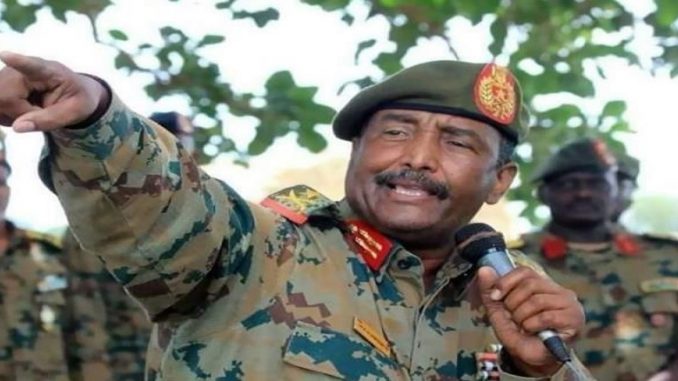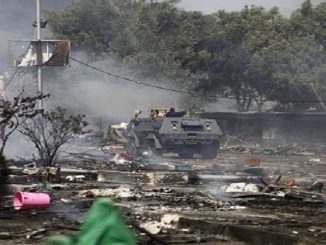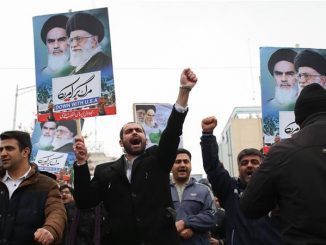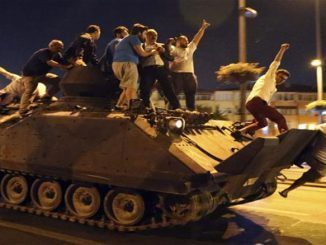
Negotiations over political transition put on ice as violence flares in Sudan, leaving several demonstrators wounded.
At least 14 people have been wounded, some from gunfire, when Sudanese forces tried to remove demonstrators from central Khartoum, according to a group linked to the protest movement, while Sudan’s military rulers suspended talks with opposition leaders on the installation of civilian rule for at least 72 hours.
The violence has endangered negotiations between the two sides that had appeared to be on course to reaching a deal on forming a joint sovereign council designed to steer the country towards democracy for a three-year transition period until elections were called.
Both the Sudan military and the opposition blamed each other for Wednesday’s violence.
“We hold the military council responsible for attacking civilians,” said Amjad Farid, a spokesman for the Sudanese Professionals’ Association (SPA), which spearheaded months of protests that led to the military’s removal of President Omar Al-Bashir last month.
“They are using the same methods as the previous regime in dealing with rebels,” he told Reuters news agency.
But the head of Sudan Transitional Military Council (TMC), Lieutenant General Abdel Fattah al-Burhan, accused the demonstrators of breaking an understanding on the de-escalation process while talks were under way and said protesters were disrupting life in the capital by blocking roads outside a protest zone agreed upon with the military.
In a televised speech broadcast early on Thursday, al-Burhan read out a long list of what he described as violations of understandings that had been reached with protest leaders and said the TMC had decided to call off talks for three days “until a suitable atmosphere is created to complete an agreement”.
“We decided to suspend the negotiations over civilian rule for 72 hours to help prepare an atmosphere for completing the deal,” al-Burhan said, demanding that protesters dismantle roadblocks in Khartoum, open bridges connecting the capital and other regions and “stop provoking security forces”.
Al-Burhan, the chief of the TMC that took power after overthrowing and jailing al-Bashir on April 11, justified the decision to suspend the crucial and final phase of negotiations by indicating that the overall security situation in the capital had deteriorated.
He said bridges, roads and a railway line had been closed and there was an “infiltration of armed elements among demonstrators who were shooting at security forces”.
Tensions running high
The developments came hours after protesters said troops in military vehicles using the logo of the paramilitary Rapid Support Forces (RSF) fired extensively as they tried to clear demonstrators on al-Mek Nimir Avenue in central Khartoum, near the foreign ministry.
Sudan Central Committee Doctors said at least 14 people were wounded.
“People were walking towards the barricades and they (security forces) were firing shots at them,” a 20-year-old demonstrator, who asked not to be named, told Reuters news agency, showing a handful of empty bullet casings and referring to roadblocks set up by protesters.
The RSF denied opening fire at demonstrators, state TV reported.
The violence took place hours before the TMC was due to meet representatives of the umbrella opposition group Declaration of Freedom and Change Forces (DFCF) to try to hammer out the final deal for the transition period.
Al Jazeera’s Hiba Morgan, reporting from Khartoum, called the suspension of the talks a “very significant development” that showed “the level of tension between the two sides”.
“Looking ahead, there is a lot of tension and many challenges between the two sides in trying to form a transitional government.”
Deadly violence
The violence came after the TMC announced earlier on Wednesday that after two days of talks it had brokered a deal with the DFCF alliance on the composition of a legislative council and a three-year transition period to a civilian administration.
Under the agreement the opposition alliance would have two-thirds of the seats on a legislative council, the TMC announced.
However, the two sides have yet to agree on the make-up of a sovereign council, the envisaged top tier of power during the planned transition period, with both wanting majority representation.
Amid the back-and-forth discussions, protesters pushing for a civilian-led transition have remained on the streets, including outside the army headquarters where a sit-in started on April 6.
Some roads in the centre of Sudan capital’s Al-Khartoum have been blocked with stones, bricks, branches and slabs of concrete that security and paramilitary forces have occasionally tried to remove.



